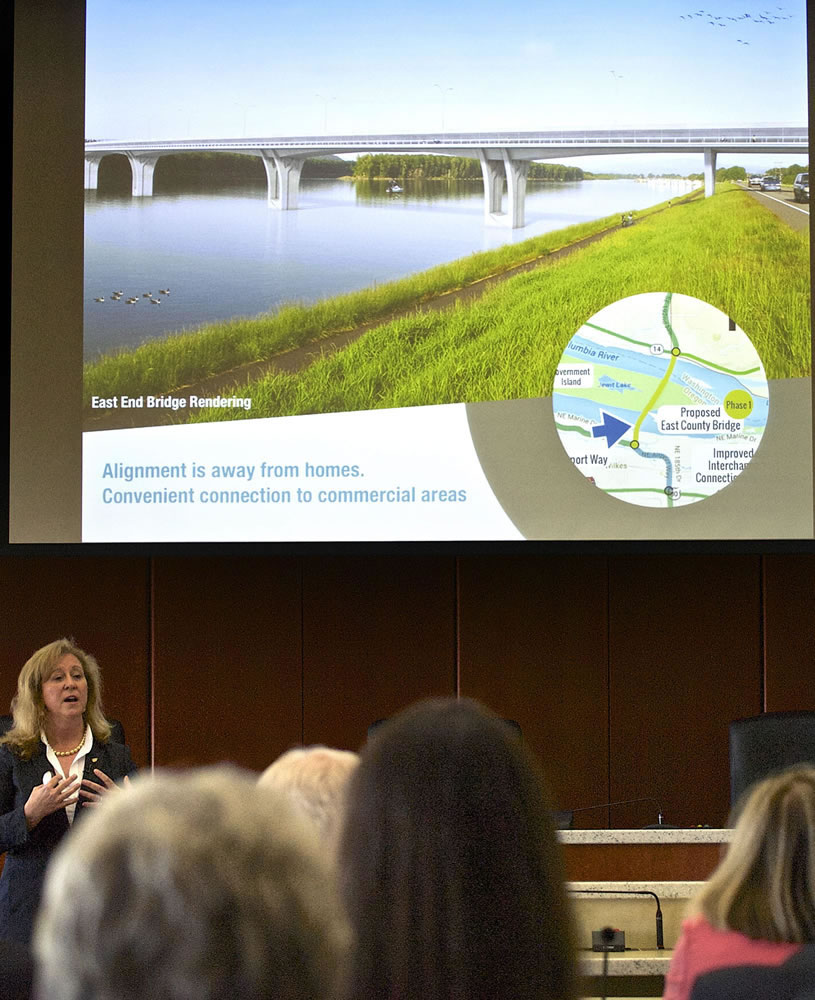With a 2-1 vote, Clark County commissioners Tuesday approved placing an advisory vote on November’s general election ballot intended to gauge the public’s desire to pursue the development of a $860 million third bridge over the Columbia River.
The green light came less than a day after six of seven Vancouver City Council members said they opposed the idea of a new bistate bridge, which, as proposed, would launch from within the eastern edge of the city, cross the river and Government Island and land in east Portland.
Commissioners David Madore and Tom Mielke voted for two resolutions at their morning hearing. The first created a policy that defined and supported a “toll-free” bridge. The second called for placing an advisory vote on the November ballot. Advisory votes are nonbinding measures intended to provide elected officials with policy direction.
Barnes not consulted
Commissioner Ed Barnes cast a vote in opposition, grousing that he hadn’t seen the two resolutions until Tuesday morning.
“You kept it away from me, from what I can tell,” Barnes said, directing his comments at commissioners Mielke and Madore.
“I never saw either one of these resolutions until they were laid up here in front of me this morning,” he said.
In response, Mielke said Barnes had made his position on the east county bridge clear — that he opposed it — and that the other two commissioners understood that position.
Tuesday’s hearing was intended to give the public an opportunity to voice their opinions of the project, championed by Madore as an alternative to the defunct Columbia River Crossing.
It came four days after a bridge design firm working on an “unsolicited bid” for the project — Florida-based FIGG Engineering Group — unveiled its proposal, including a design, at a special county meeting attended by a smattering of local elected officials. The county has said that it hasn’t paid FIGG for its work.
FIGG’s concept is of a four-lane bridge extending from Southeast 192nd Avenue, inside Vancouver city limits, over Government Island, mostly owned by the Port of Portland, to Northeast Airport Way on the Oregon side.
The bridge would also have covered pedestrian lanes on both sides.
A second phase of the project would connect the bridge to Interstate 84. That’s not part of FIGG’s current proposal, however, because it would require buy-in from the federal government and delay a project the firm says it can complete in five years.
Most of the testimony Tuesday centered on concerns that the county would face jurisdictional roadblocks in moving the east county bridge forward. In addition to the city of Vancouver, the county would have to woo several other state and local agencies, plus both state Legislatures, before the bridge could take shape.
“You don’t have the jurisdiction in the city of Vancouver, and you don’t have the jurisdiction in another state,” said Paul Montague, who was a strong proponent of the CRC when he was president of Identity Clark County. “You’ve alienated possible partners on both sides of the river and, actually, the quote I’ve heard from Oregon officials from time to time is, ‘You’re welcome to build a bridge in the east county, but make sure you build to the (Oregon) state line and with a U-turn in the middle.’ “
He also decried the advisory vote process, which he called akin to licking a finger, sticking it in the air and feeling which way the wind was blowing.
Proponents of the project, primarily Madore, have suggested that both sides would have to move away from the acrimony that came to define the Columbia River Crossing and work together on a new project.
“All we need is good will — I guess commitment — from our local leaders,” he said.
He called the advisory vote process a good way to understand the “will of the people.”
While a financing plan for the $860 million bridge project remains a question mark, Madore said that leaders from Washington and Oregon would have to come together and figure that out.
As written, the advisory vote will ask residents whether they support a toll-free bridge. But even with that language in place, FIGG Engineering has floated the possibility of adding tolls to the bridge as a way of financing it.
On Tuesday, Madore doubled down on his position on the project, saying “tolls are off the table.”



